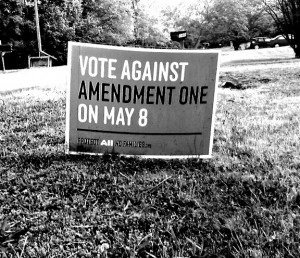 North Carolina’s primary elections will be held Tuesday, May 8, and students who can vote will have a chance to help decide outcomes of important statewide and national issues. One such issue will be the Republican Party’s choice of a presidential nominee, who will run against President Barack Obama in the 2012 November election.
North Carolina’s primary elections will be held Tuesday, May 8, and students who can vote will have a chance to help decide outcomes of important statewide and national issues. One such issue will be the Republican Party’s choice of a presidential nominee, who will run against President Barack Obama in the 2012 November election.
Mitt Romney currently has the most support from the Party and at this point is virtually unchallenged. Most of the politicians he was running against earlier this year have left the race. Just in the last month, Romney’s two biggest challengers, Rick Santorum and Newt Gingrich, suspended their campaigns. Santorum went first, despite having much more support from voters than Gingrich. Civics teacher Roddy Story says the Gingrich campaign outstayed its welcome, and put Santorum at a disadvantage.
“Had Newt Gingrich dropped out a couple months ago, when a lot of people thought he was going to, and, perhaps, should have, then Santorum would have gotten a lot of those voters and probably could have been a legitimate threat to Romney,” said Story.
Gingrich announced that he would suspend his campaign after Romney won all five primaries held April 24. At this point, Romney is all but assured the party’s nomination.
Republicans have mixed opinions about the man who is likely to be their nominee.
Some people, like Republican sophomore Allie Ray, support Romney because “he’s not incredibly conservative.” Others find that his moderate-conservative policies leave a little to be desired.
“I’m a Republican myself, and personally, I feel that [Republican ideals] aren’t going to win,” freshman Brandon Kelly said. “We’re just going to have another ‘Obama,’ whether it’s Mitt Romney or Obama; we are going to have another ‘Obama’ in office.”
Conservatives like Kelly don’t think Romney represents the Republican Party as they see it.
Another issue on the ballot in May is a vote on whether the state should pass an amendment to its Constitution that is commonly known as the “Marriage Amendment.” There are currently state laws that prevent same-sex marriage, but this amendment would make that prevention a part of the state Constitution. The amendment also has potential to influence the legality of civil partnerships and domestic unions. These are legal standings used by a variety of North Carolina couples who, for different reasons, do not have a marriage but still want the legal benefits of one.
North Carolina House Representative Mitch Gillespie supports the amendment and told The News & Observer that he expects “a large bipartisan vote on it.” However, because President Obama is the only Democratic candidate for the presidency in this election, there will not be a vote for a Democratic nominee. Meaning there will likely be more Republican voters attending the primary than Democratic ones, though the disparity might be smaller due to the now less-contested Republican contest.
Republican junior Drew Hill supports the amendment.
“I’m a religious person and it says in the Bible that a man and man or woman and woman shouldn’t marry, so I personally think that there should still be a ban on gay marriage.”
Sophomore Carter Smith, who opposes the amendment, does volunteer work called phone banking. The group she works with calls Democratic voters and encourages them to vote at the primary.
“We don’t want it to be just the Republicans [that vote on this], we want it to be everyone…. Everyone who is able to vote and who has parents who are able to vote should be encouraged to find out as much as they can about this amendment from both sides of it, not just against it, and really make the decision for themselves,” Smith said. “This is a big issue and we really need to work on figuring out what we want our state to be like.”
Senior and independent voter Rebecca Moore shares this point of view.
“I think you are born gay and I think it should be every person’s decision what they should do with their life,” Moore said. “I’m going to vote. Everybody should vote.”
–By Quinn Kerscher
